Commissioner Adam Silver: NBA likely to alter playoff seeding structure

OAKLAND, Calif.—The NBA isn't anticipating any radical changes in the near future, but commissioner Adam Silver suggested that one key tweak is on the horizon.
During his annual address prior to Game 1 of the Finals between the Warriors and Cavaliers, Silver said that the league will likely change its playoff format by stripping the guaranteed top-four seed given to division winners.
"We are very focused on the divisional seeding process, and I think we are going to take a very close look at whether we should seed at least 1 through 8 by conference as opposed to giving the division winner that higher seed," Silver said. "We may change that fairly quickly. ... That is a vestige of a division system that may not make sense anymore."
• MORE NBA: SI's Finals coverage | Playoff schedule | Finals subplots
This season, the top-four seed for division winners played a key role in determining the Western Conference's playoff matchups. Portland, by virtue of winning the Northwest Division, was granted the No. 4 seed despite finishing with a 51-31 record, which was the sixth-best record in the West. As a result, Memphis (55-27) and San Antonio (55-27) were bumped down to the No. 5 and No. 6 seeds. That chain reaction led the Spurs to face the No. 3 seed Clippers (56-26) in the first round. That matchup produced a highly competitive series, but many observers felt it was unfair to the Clippers and the Spurs to make them face off in the first round.
If the Blazers hadn't had the guaranteed top four seed due to their division title, they would have slotted in as the No. 6 feed, facing the No. 3 Clippers. The No. 4 Grizzlies and the No. 5 Spurs would have then faced each other. That setup would have been more reflective of regular-season performance.
• MORE NBA: Key Finals matchups | NBA Finals preview | Roundtable
Although many observers, including SI.com, have pushed for a more substantial change to the NBA's playoff format by simply taking the top 16 teams, regardless of conference, Silver said the league has considered and rejected the idea.
"While [the 1 through 16 proposal] seems attractive in many ways, because of the additional travel that will result, it just doesn't seem like a good idea at the moment," Silver said. "For example, this [Warriors] team would have played Boston in the first round under a 1 through 16 seeding and would have had to crisscross back and forth across the country, which does not seem like a good idea, especially based on the earlier question based on the health of our players, and focusing on actually reducing the amount of travel and back-to-back [games]."
Here's a quick rundown of the other topics touched on by Silver.
Collective Bargaining Agreement Negotiations: The NBA's next labor war could come in July 2017, when the owners and the players both hold the right to opt out of the league's current collective bargaining agreement. Silver said he has spoken with representatives of the National Basketball Players Association to discuss "how both sides feel the collective bargaining agreement is working" and to generate a list of possible changes.
Silver sounded open to the idea of further talks with the NBPA and executive director Michele Roberts.
"My feeling is the league is doing incredibly well," he said. "The players are doing really well. Popularity is at an all‑time high. So I think it would be very constructive to sit down sooner than later to start talking about to the extent there should be changes in the collective bargaining agreement and what both sides would like to see."
Intentional Fouling: The Hack-a-Shaq strategy has been a hot topic lately, as it was aggressively implemented in a first-round series between the Clippers and Spurs and a second-round series between the Clippers and Rockets. Proponents of the current rule, which allows players to be fouled repeatedly off the ball before the final two minutes of the game without a meaningful penalty, generally argue that a rule change would amount to a reward for poor free throw shooters. Critics of the current rule assert that the strategy slows the game down and makes for an ugly, fan-unfriendly product.
Silver said that the league's GMs met recently to discuss the issue, and "most" of the GMs were against changing the rules.
"The data shows that you're largely talking about two teams throughout the playoffs," Silver said. "In fact, 90 percent of the occurrences of Hack‑a‑Shaq involve the Rockets and the Clippers. For the most part, it's two players -- 75 percent [of intentional fouls] involved DeAndre Jordan and Dwight Howard. So then the question becomes: Should we be making that rule change largely for two teams and two players?"
The commissioner added that "minute-by-minute" viewership data from the television broadcasts suggests that fans aren't responding to the strategy by turning off the TV or changing the channel. That said, Silver promised a "robust discussion" on the topic among the league's owners this summer, adding that he would prefer the rule to remain as is for another season so that the effectiveness of the strategy could come under great scrutiny. "In so many of the situations with which it was used this year ... it flat out wasn't effective," Silver said. "If a player can hit 50 percent of his free throws, it defeats the strategy."
Draft Lottery Reform: Another subject that Silver is hoping to table for a while is a reform of the league's draft lottery system. Last fall, Silver proposed changes to the weighted odds that determine the top picks in the draft in an effort to reduce the incentive for teams to tank. That effort was ultimately voted down, and Silver isn't ready yet to try again. The main reason: He wants to see what impact the increased salary cap, set to kick in for the 2016-17 season, has on the decision-making of the league's 30 teams.
"I am in favor of making modifications to the draft lottery," Silver said. "I'm currently of the view that's actually one I think we should park at least for a year. ... We're going to go from a cap of I think approximately $67 million next year in the 2015‑16 season to a cap of roughly $90 million in the 2016‑17 season. What I've learned from this league, having been around a long time, is that our smart teams figure out angles, approaches, that we just can't possibly model.
"My hesitation now to push through a change on the draft lottery is without knowing how our teams are going to react. It's a massive amount of capital that's going to come in from one year to the next. Something that's never happened before in the history of this league. That's one issue where I feel that even though I think a change in the draft lottery is needed, we should wait and then take a look at it holistically when we see how the whole system will operate under much higher caps."
Concussion Protocol: The NBA's process for treating head injuries came under some scrutiny during the Western Conference finals when Warriors guards Stephen Curry and Klay Thompson both suffered head injuries. Curry was cleared to return to Game 4 after taking a bad fall, while Thompson was initially cleared to return to Game 5 after taking a knee to the head before later being diagnosed with a concussion. Silver defended the NBA's concussion protocol, which includes oversight by an independent doctor, and said that the Warriors followed the necessary steps in both cases.
"We have a protocol in place and a prominent national neurologist who is in charge on behalf of the league in setting that protocol just so no particular team feels pressured to go outside of a set of rules and get that player back on the floor," he said. "Our protocols were followed exactly as mandated in the case of both players. I've had discussions with the Players Union as to whether there are other ways to do it, and my response has been [that] we're all ears. ... We think the best way we're approaching it now is best in class in terms of medical and science information that's available to us."
FIFA Scandal: With international soccer embroiled in a corruption scandal, Silver was asked whether he felt FIFA's basketball counterpart, FIBA, faced similar issues.
"There's been absolutely no suggestion that FIBA, our federation, as opposed to FIFA, has been tainted in any way by corruption," he said. "I know the head of our federation, Patrick Baumann, very well. He's been someone I've been working with for over 20 years. And in fact, Mark Tatum, the Deputy Commissioner of the NBA, is on the executive board of FIBA. [FIBA is] a very transparent organization. Their financials are audited. They have open board meetings. There's never been a discussion in our sport of any of the sort of taint that we're seeing right now in FIFA."
It likely goes without saying, but none of FIBA's events are really comparable in size and scope to the FIFA World Cup.
Bucks' Stadium: The small-market Milwaukee Bucks have been seeking a deal with local government to fund a new stadium to replace the Bradley Center. When the Bucks were sold recently to new owners Marc Lasry and Wesley Edens, the agreement stipulated that the NBA could buy back the franchise if an arena deal wasn't in place by 2017. Silver said "there is a bit of a negotiation going on" regarding the specifics of the arena deal, but he expressed optimism that the talks would eventually prove fruitful.
"I think at the end of that day, that team's going to be in Milwaukee for a long time," he said. "And in relatively short time that negotiation will be completed and they'll be announcing the team is staying with a new arena."
Warriors' Stadium: The Warriors have spent years working through plans to build a stadium in San Francisco that would replace Oakland's Oracle Arena as the team's home. Those plans happen to coincide with other stadium efforts being pursued by two other Oakland-based teams: the NFL's Raiders and MLB's Athletics.
Silver said plainly that he believes Oracle Arena, which opened in 1966, isn't going to be a long-term home for the Warriors.
"The team needs a new building," he said. "I think that's apparent every time I come here. It's apparent when we bring in big events like the Finals and we need to try—just look at the size of this room—and we need to accommodate 1,800 members of the media and broadcast crews and everything else.
The commissioner said the NBA views the Warriors as "the Bay Area's team" and referenced its previous history in San Francisco.
"I think there is a reason they're the Golden State Warriors; they're not the Oakland Warriors," Silver said, adding that relocating the franchise across the bay is a decision that will ultimately be left to owners Joe Lacob and Peter Guber.
GALLERY: Memorable moments from the NBA Finals
Memorable Moments of the NBA Finals
LeBron James | Game 1, 2014
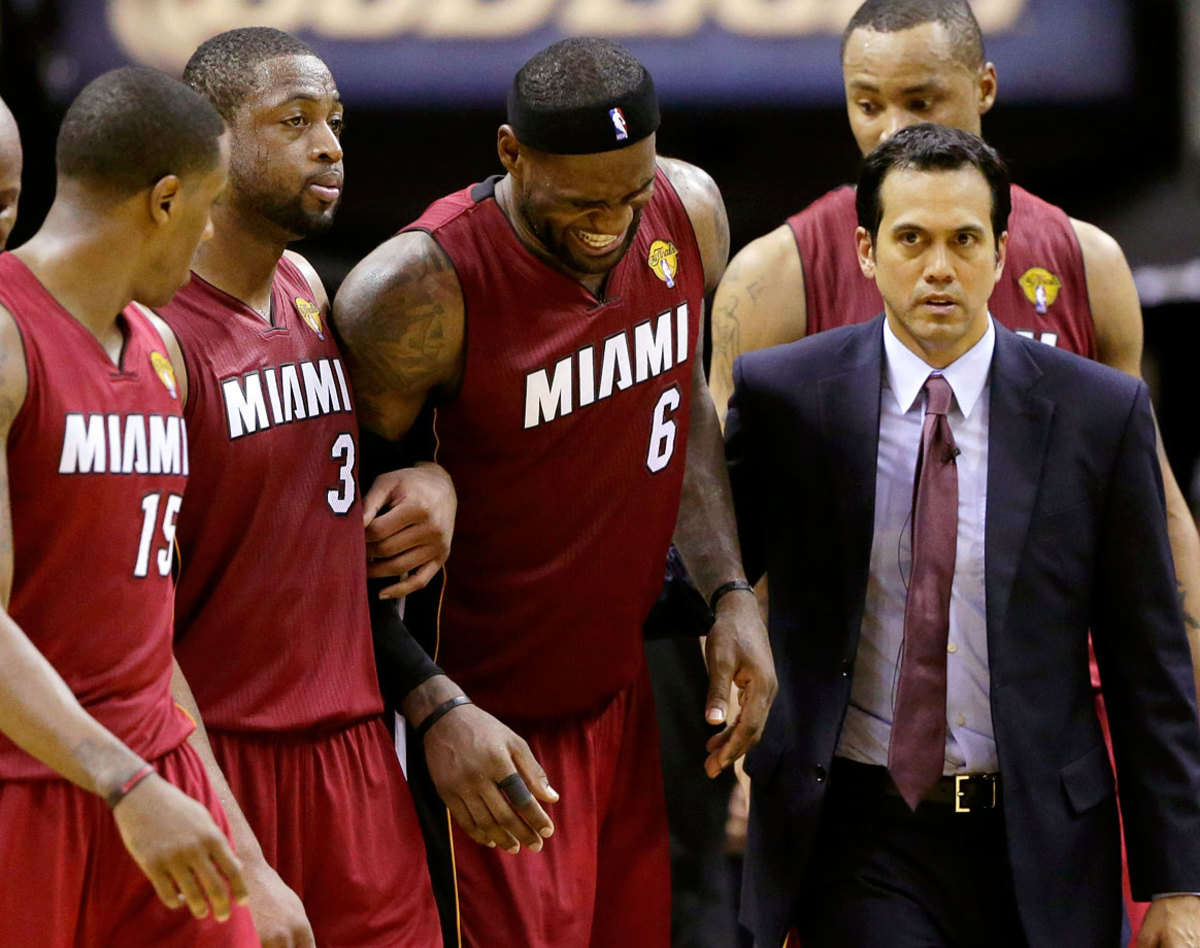
With an air-conditioning failure making it feel like a sauna and causing LeBron James to battle cramps that knocked him out of the decisive stretch, the Spurs pulled away to win the opener 110-95 against the Heat. James finished with 25 points but played only 33 minutes, and Miami was outscored 36-17 in the fourth quarter. San Antonio went on to win the Finals in five games.
Danny Green and Gary Neal | Game 3, 2013
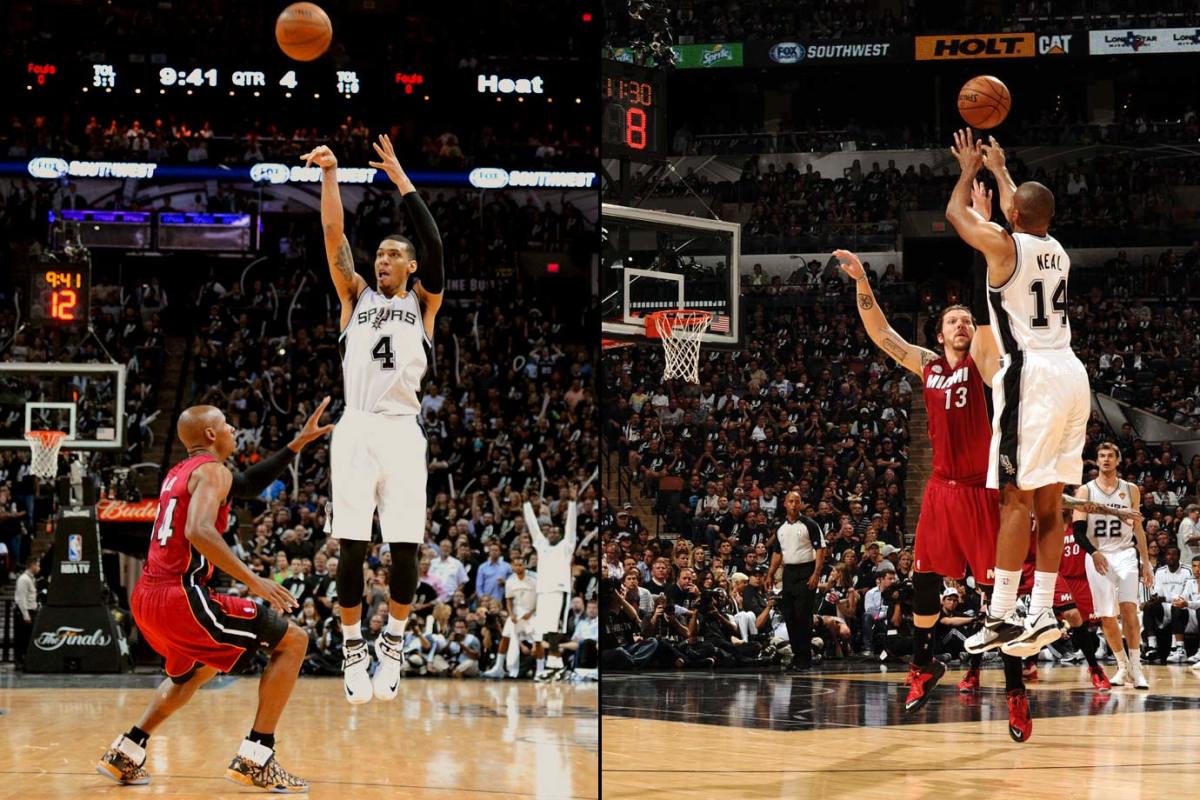
Danny Green and Gary Neal led the Spurs to a lopsided 113-77 victory over the Heat. The Spurs' 16 three-pointers set an NBA Finals record. Green made seven threes while Neal sank six from behind the line as the two scored 27 and 24 points, respectively. Two games later Green would set the Finals record for made three-pointers, when he hit his 23rd.
LeBron James | Game 6, 2013
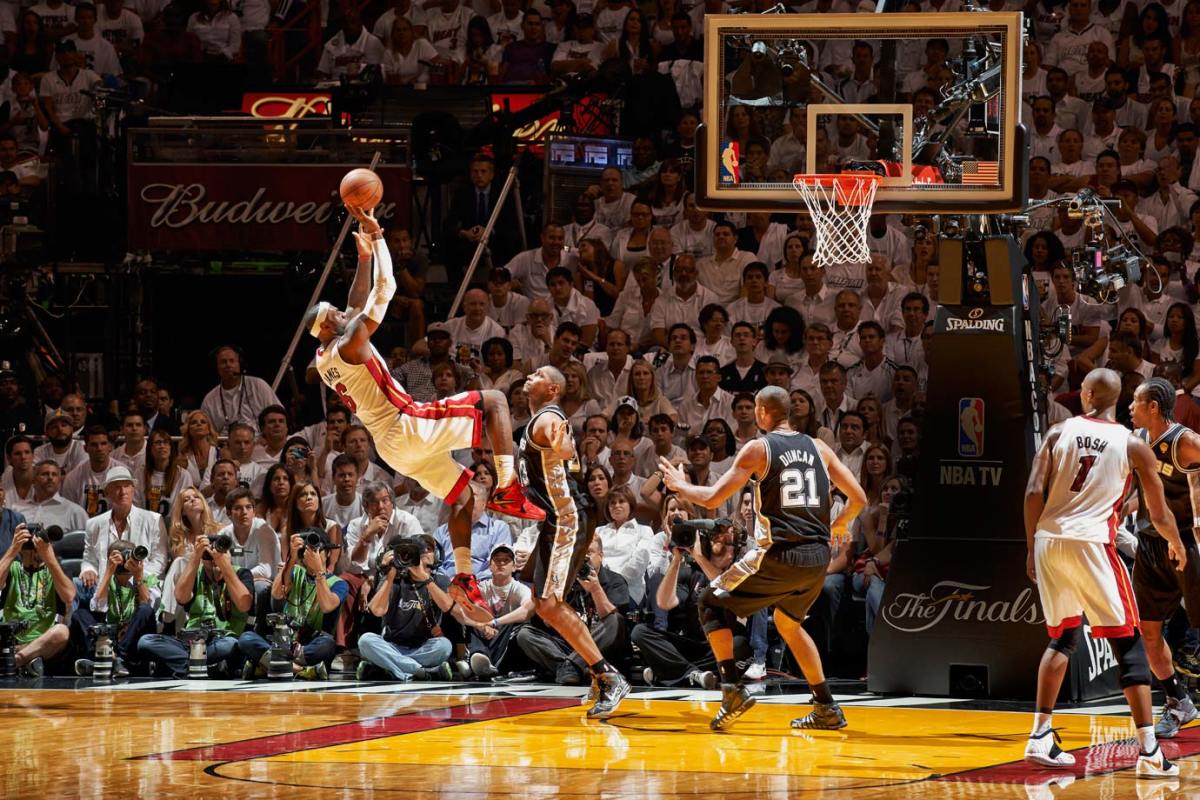
While far from his usual dominant self, LeBron James still managed to turn in a triple-double as the Heat notched a thrilling 103-100 overtime victory. Helped by Ray Allen's tying three-pointer with 5.2 seconds remaining in regulation, James overcame a couple of crucial turnovers in the final minutes to finish with 32 points, 11 assists and 10 rebounds and guide Miami to Game 7.
LeBron James | Game 5, 2012
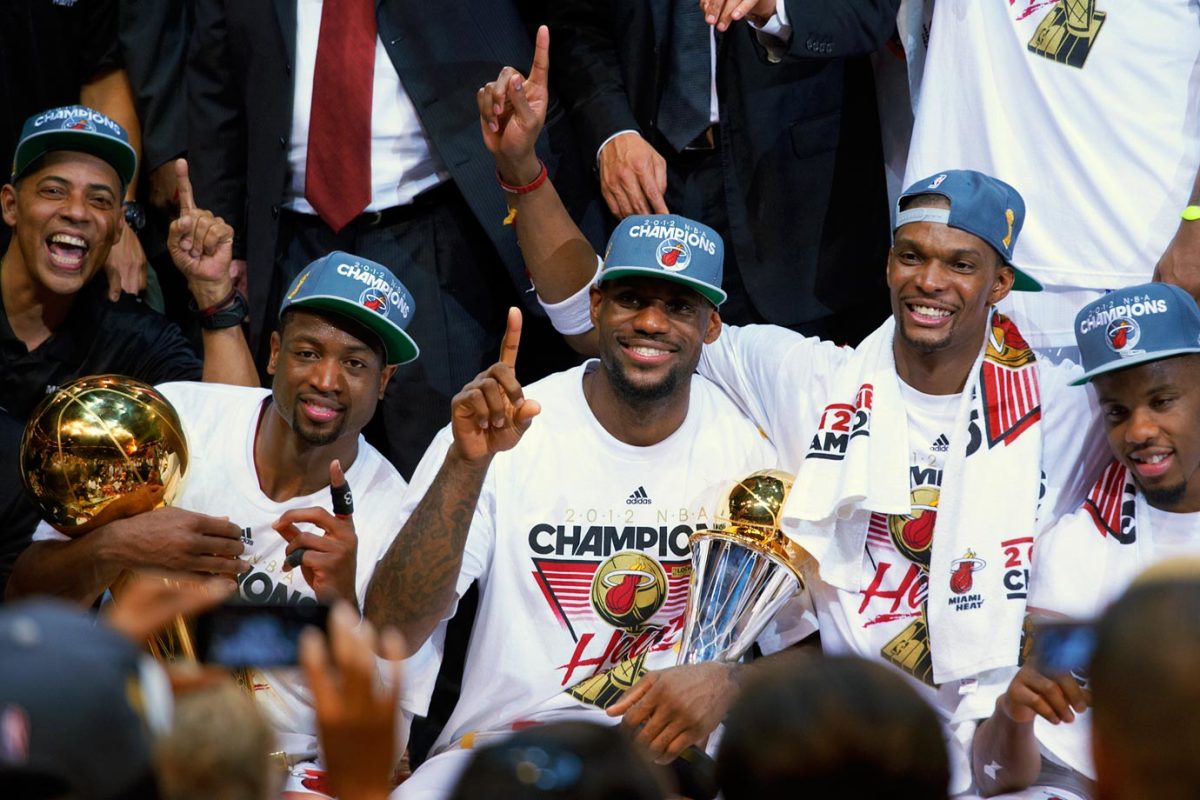
Following a triple-double of 26 points, 13 assists and 11 rebounds that was representative of his play throughout the Finals, LeBron James won his first championship after nine seasons in the NBA. Two years earlier, he was vilified for the way he left Cleveland, and for believing that winning the championship would take care of itself now that he was playing with Dwyane Wade and Chris Bosh. One year earlier, he watched Dirk Nowitzki redeem his own career with a championship earned at James' expense. But in 2012, LeBron got his title and was named MVP of the Finals in the process.
Dirk Nowitzki | Game 2, 2011
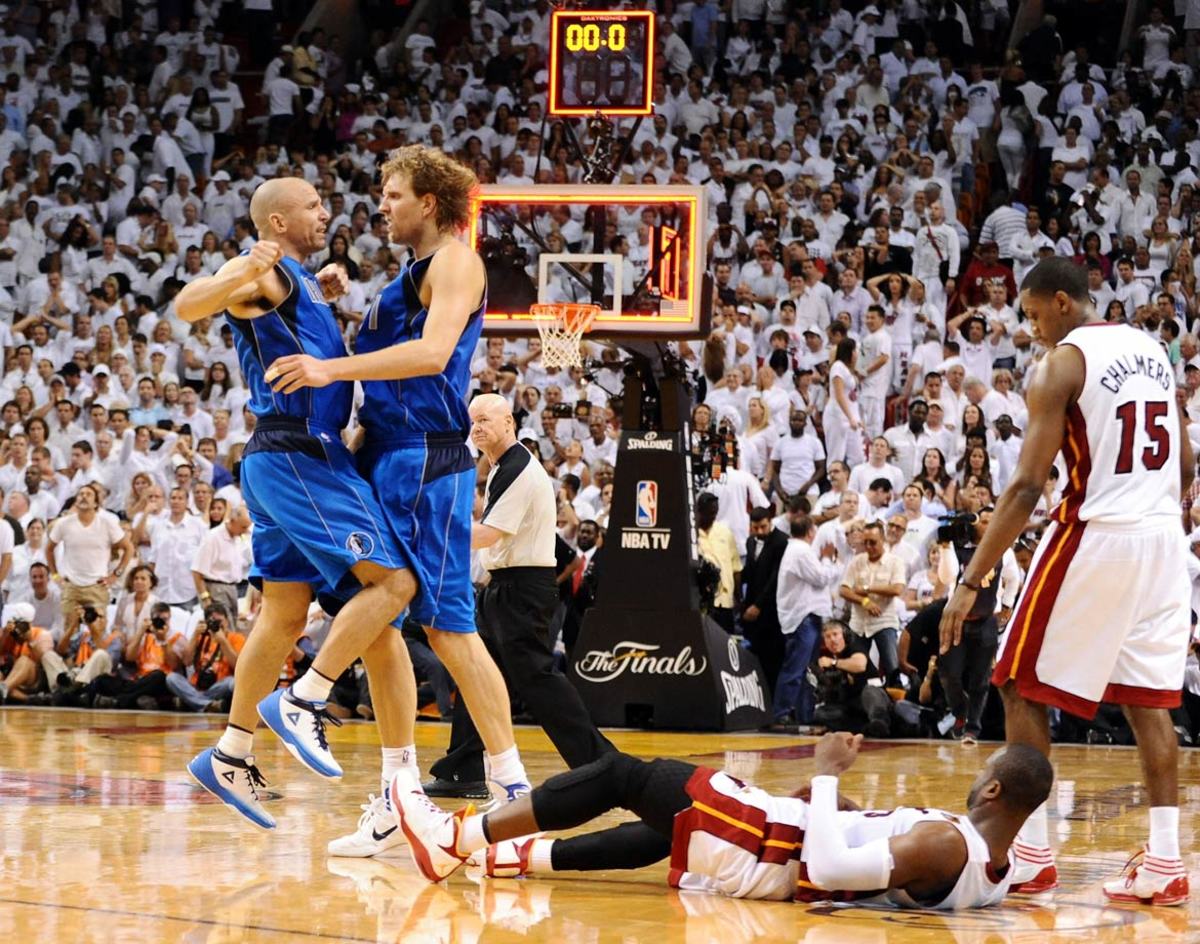
Dirk Nowitzki shook off an injury to his non-shooting hand and made the tie-breaking layup with 3.6 seconds left in regulation, and the Mavs roared back from a 15-point deficit in the fourth quarter to stun the Heat 95-93 and tie the series at one game apiece.
Dwyane Wade | Game 3, 2006
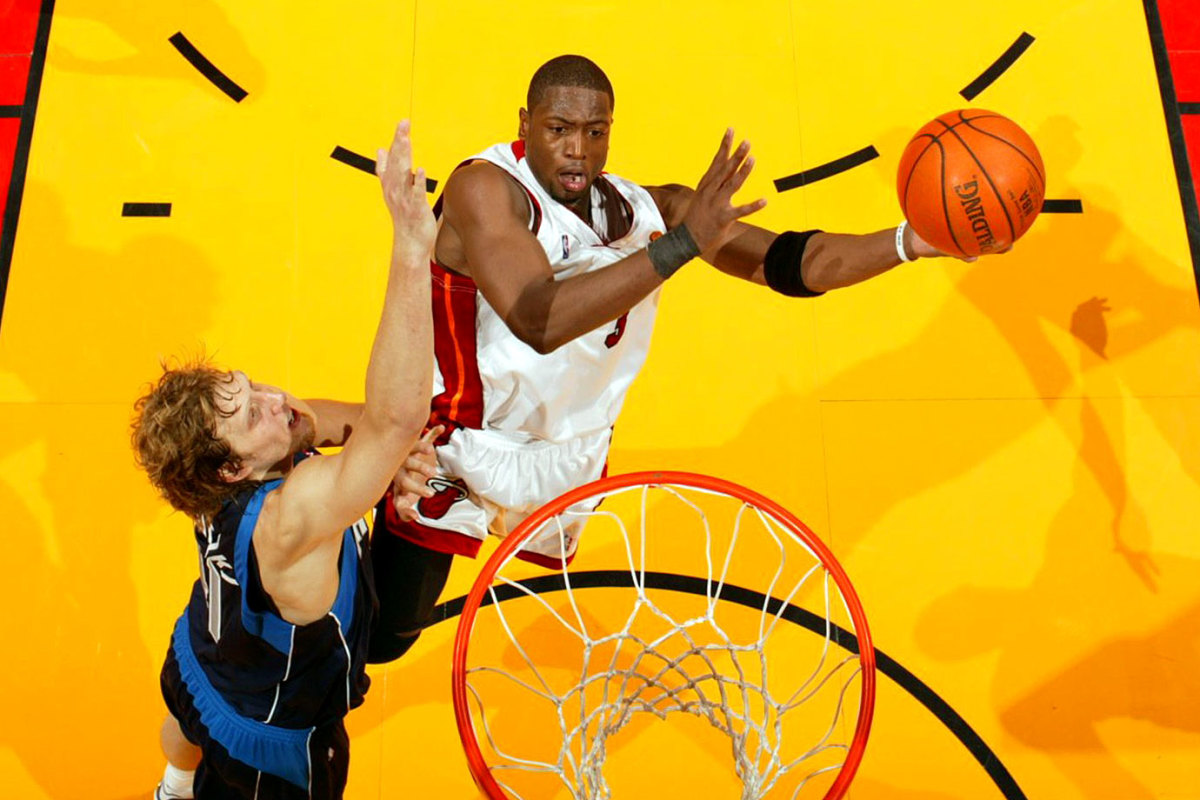
Miami lost the first two games and trailed Dallas 89-76 in Game 3. But Dwyane Wade scored 12 of his 42 points during a game-ending 22-7 run as Miami won 98-96, the first of its four consecutive victories en route to the franchise's first championship. Wade was named Finals MVP after averaging 34.7 points, 7.8 rebounds, 3.8 assists and 2.7 steals.
Robert Horry | Game 5, 2005
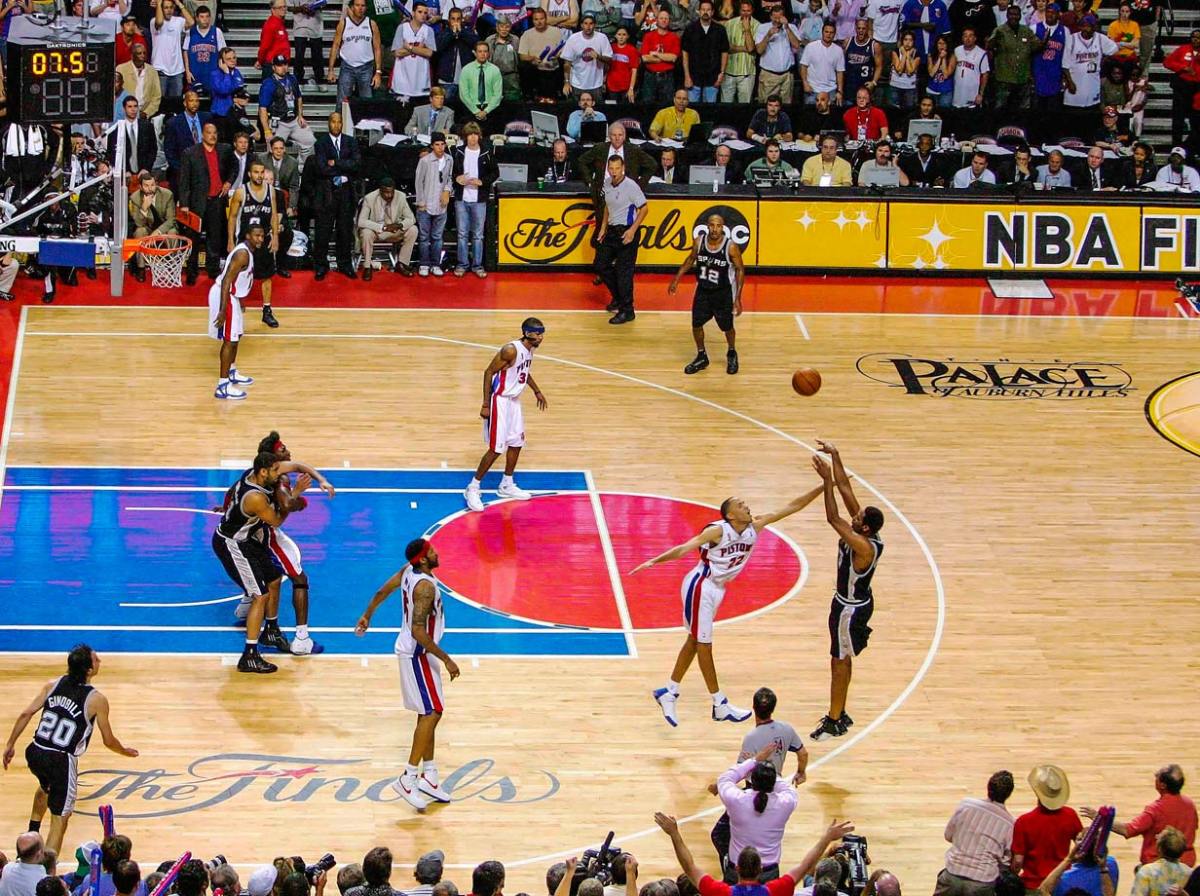
Robert Horry came off the bench to score all 21 of his points after halftime against the Pistons, including the game-winning three-pointer with 5.8 seconds left in overtime. The shot gave the Spurs a 3-2 series lead, and they won the title in seven.
Michael Jordan | Game 6, 1998
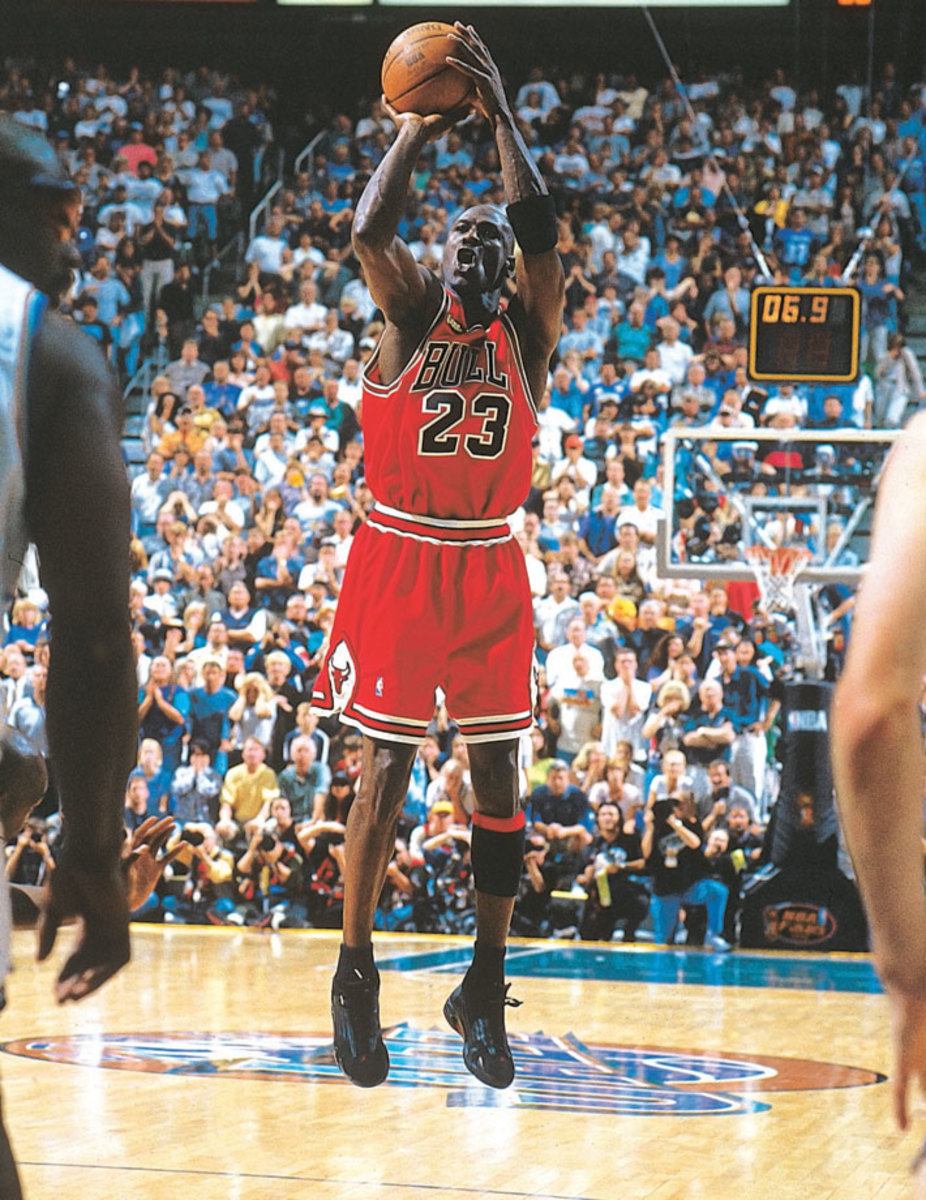
Michael Jordan scored 45 points and capped his Chicago career with a last-second jumper over Utah's Bryon Russell that clinched the Bulls' sixth title in eight seasons.
Michael Jordan | Game 5, 1997
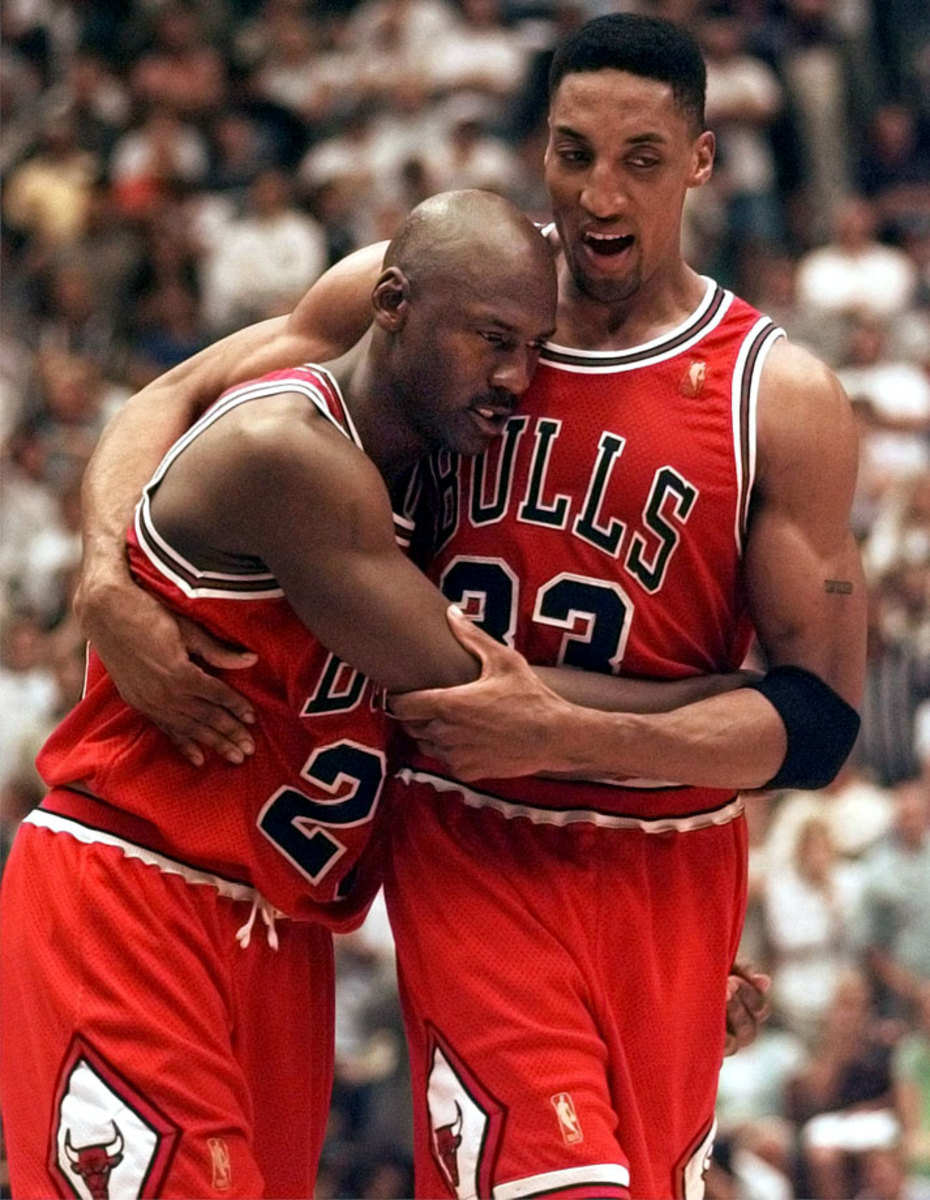
Michael Jordan fought off an energy-zapping flu bug to get 38 points, seven boards and five assists -- including the game-winning shot with 25 seconds left. Chicago went on to win its fifth championship in seven seasons.
Steve Kerr | Game 6, 1997
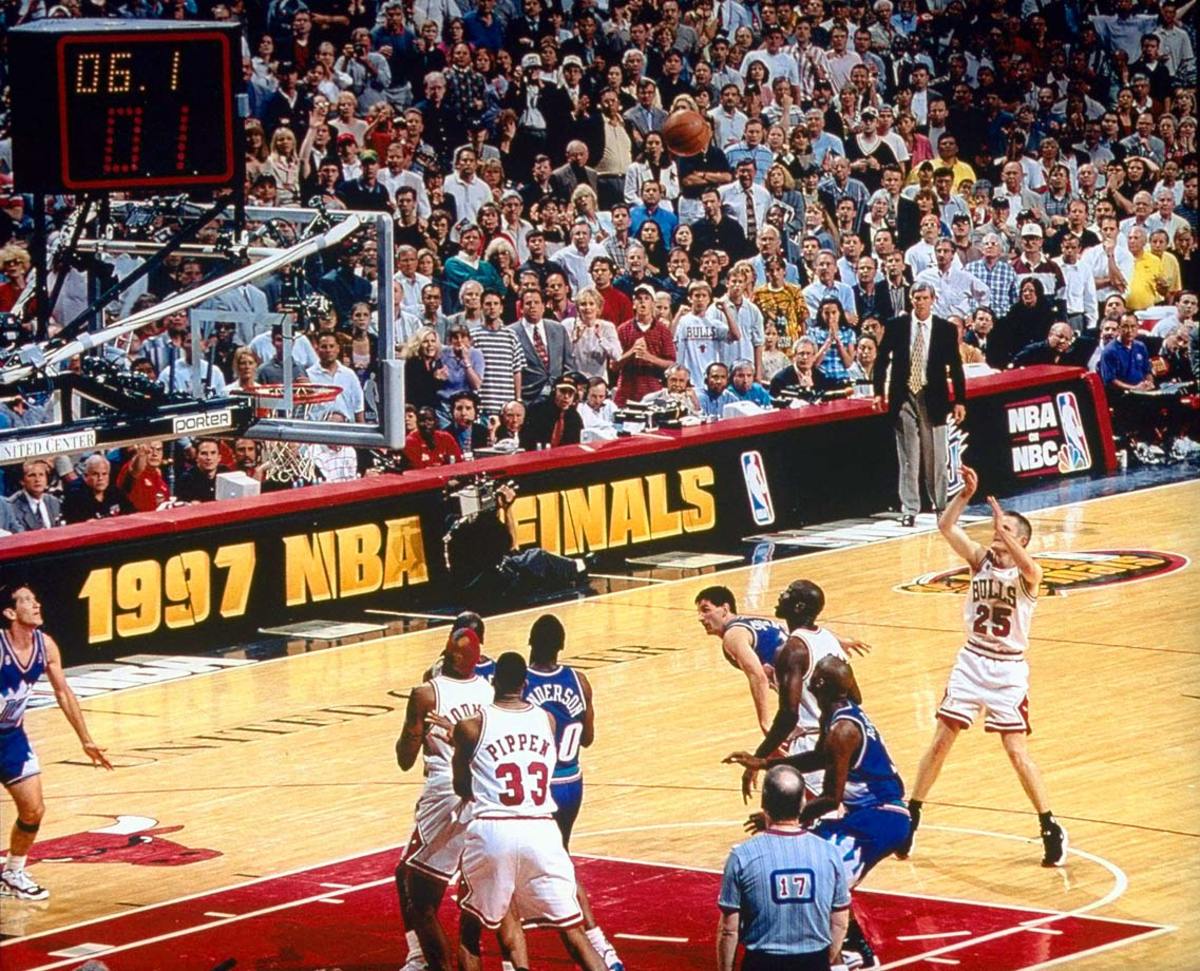
Four years after another sharpshooter (John Paxson) provided the Finals-winning jump shot for the Bulls in a Game 6 (at Phoenix), Steve Kerr did the same with a mid-range J against the Jazz in Chicago.
Rockets vs. Knicks | Game 3, 1994
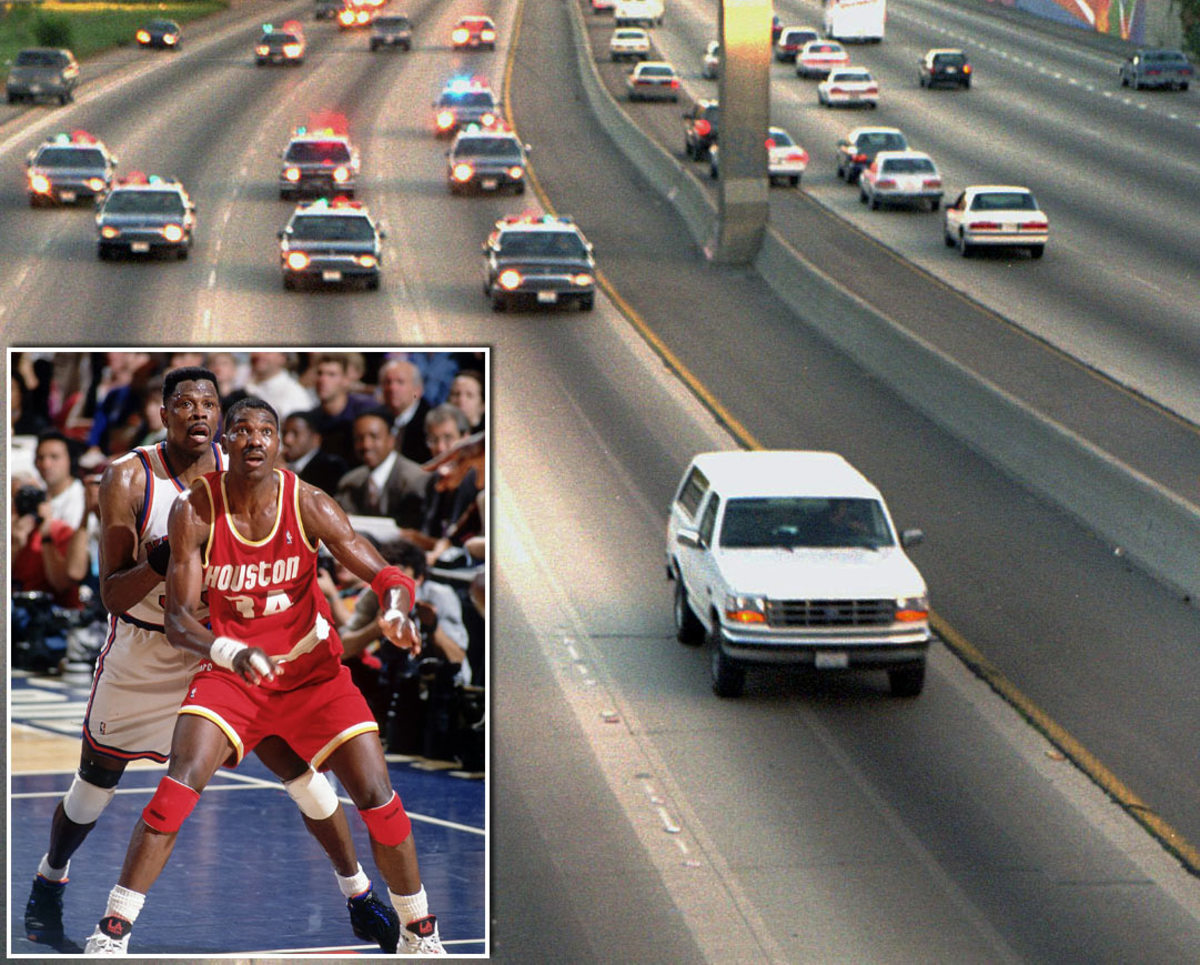
Hakeem Olajuwon and Patrick Ewing toiled in the NBA for 19 combined seasons before reaching these Finals. They were upstaged during Game 3, however, when NBC preempted Rockets-Knicks coverage to air police chasing O.J. Simpson down a Southern California freeway.
John Paxson | Game 6, 1993
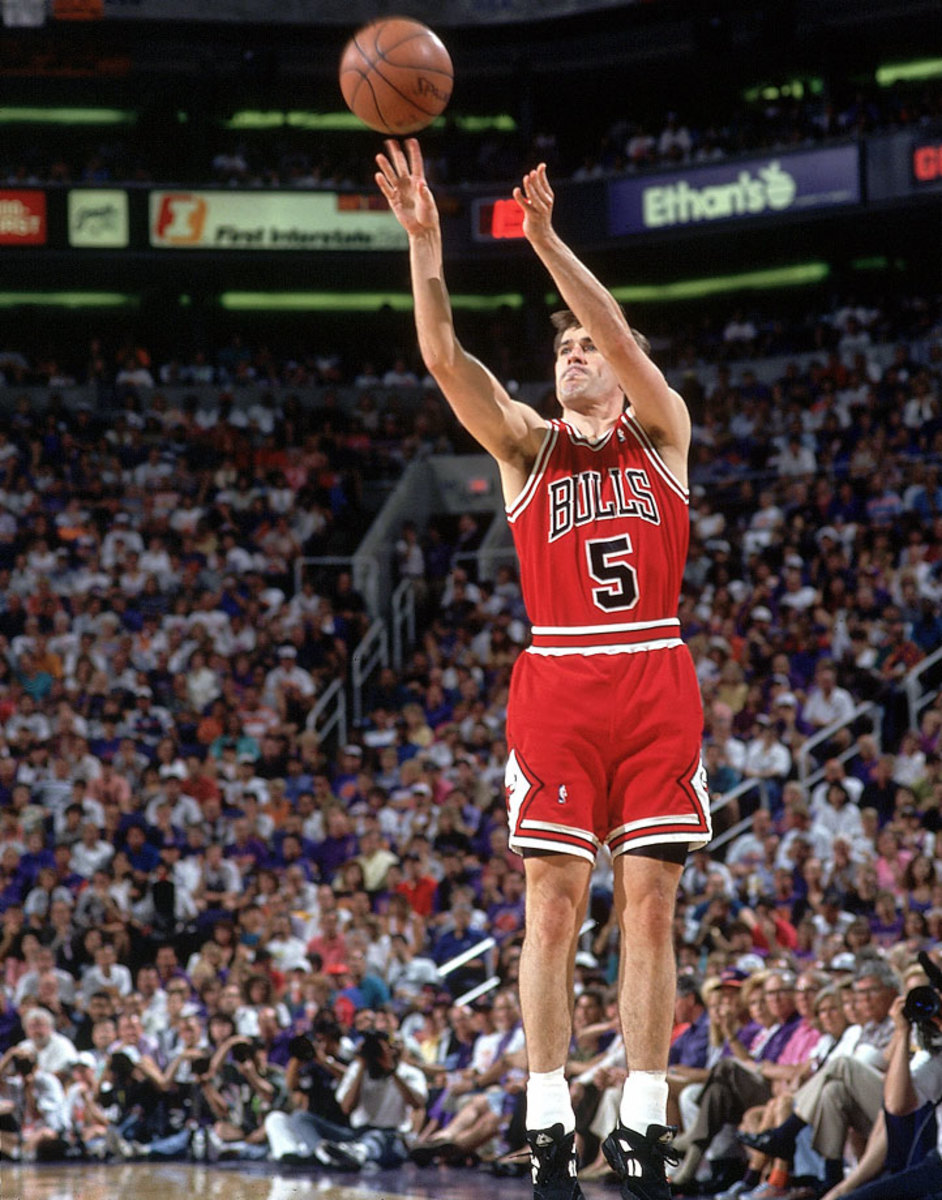
John Paxson's game-winning three-pointer in Phoenix gave the Bulls their third consecutive championship.
Michael Jordan | Game 1, 1992
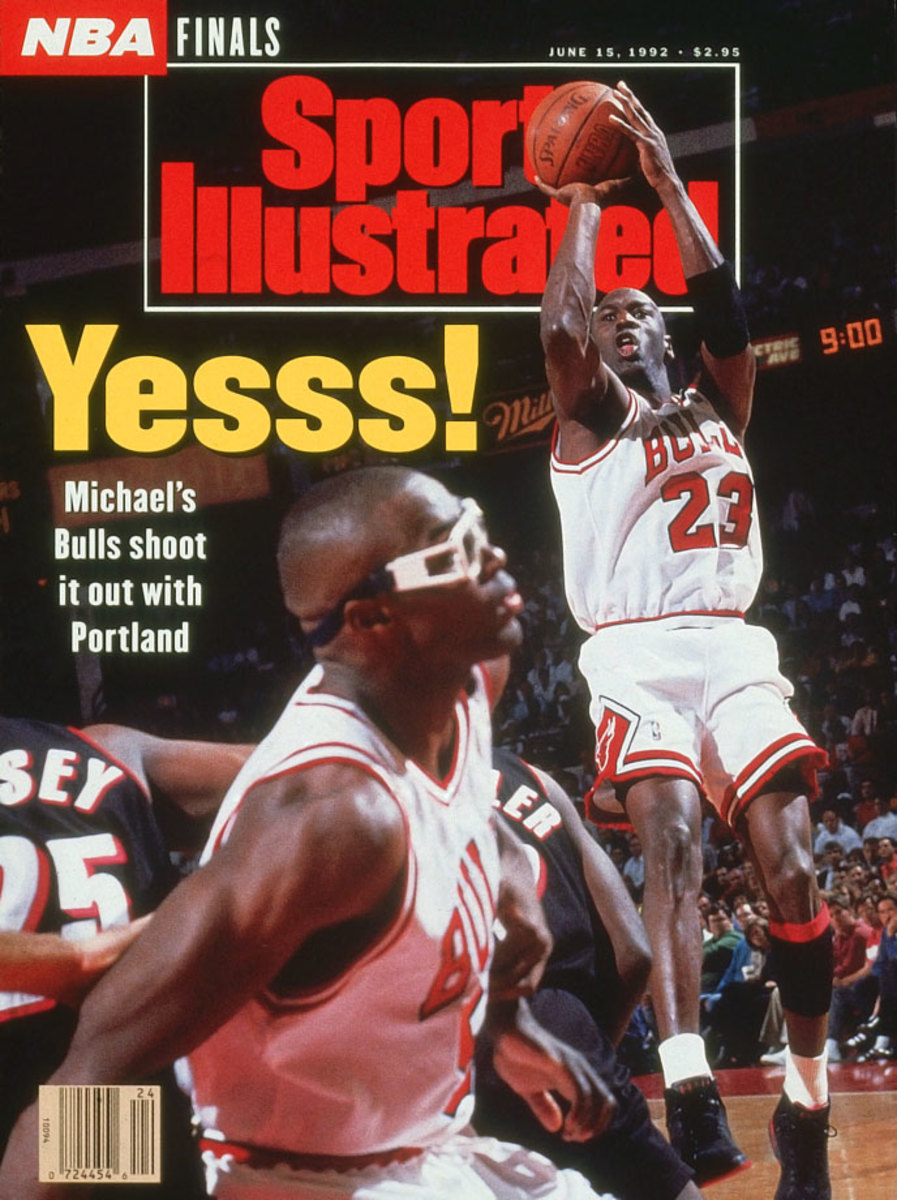
Michael Jordan hit six three-pointers and scored 35 points in the opening half against the Trail Blazers. Chicago coasted to a 122-89 victory.
Isiah Thomas | Game 6, 1988
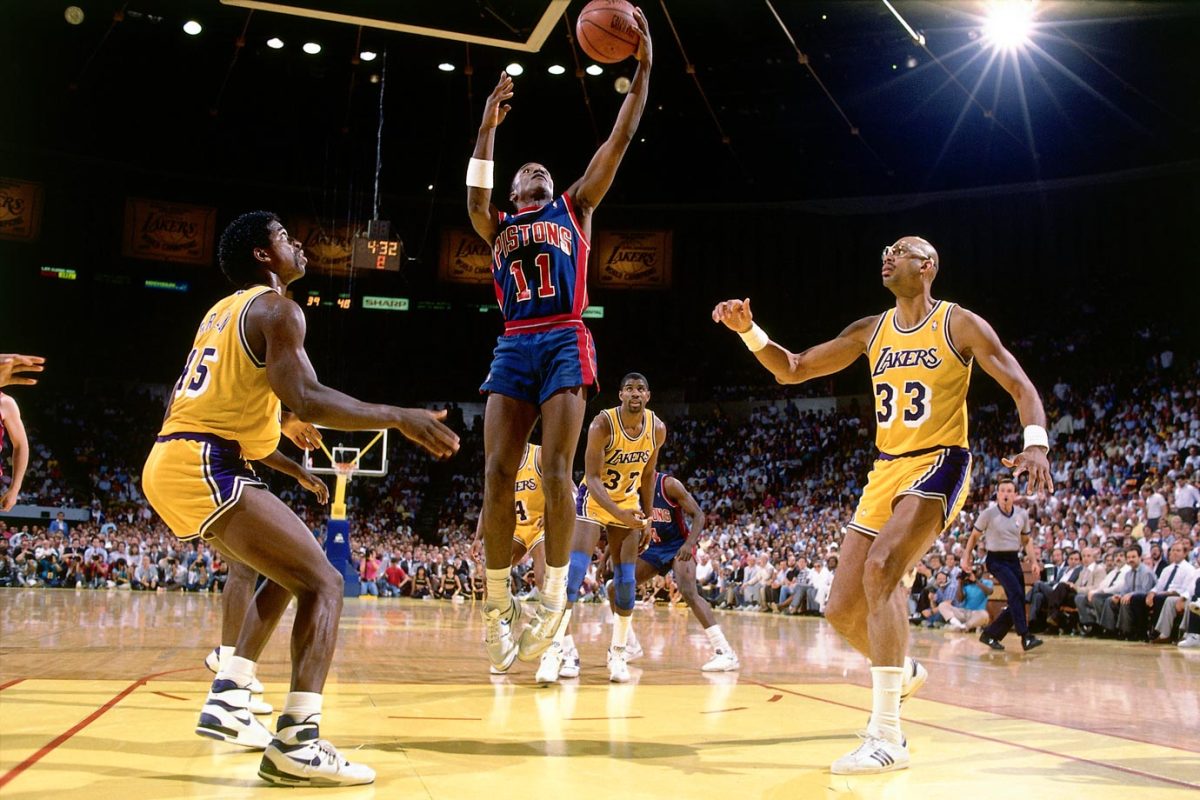
Playing on a severely sprained ankle, Isiah Thomas scored 25 points in the third quarter and almost single-handedly carried Detroit to a series-clinching victory. (The Lakers won the game and the next one, too).
Magic Johnson | Game 4, 1987
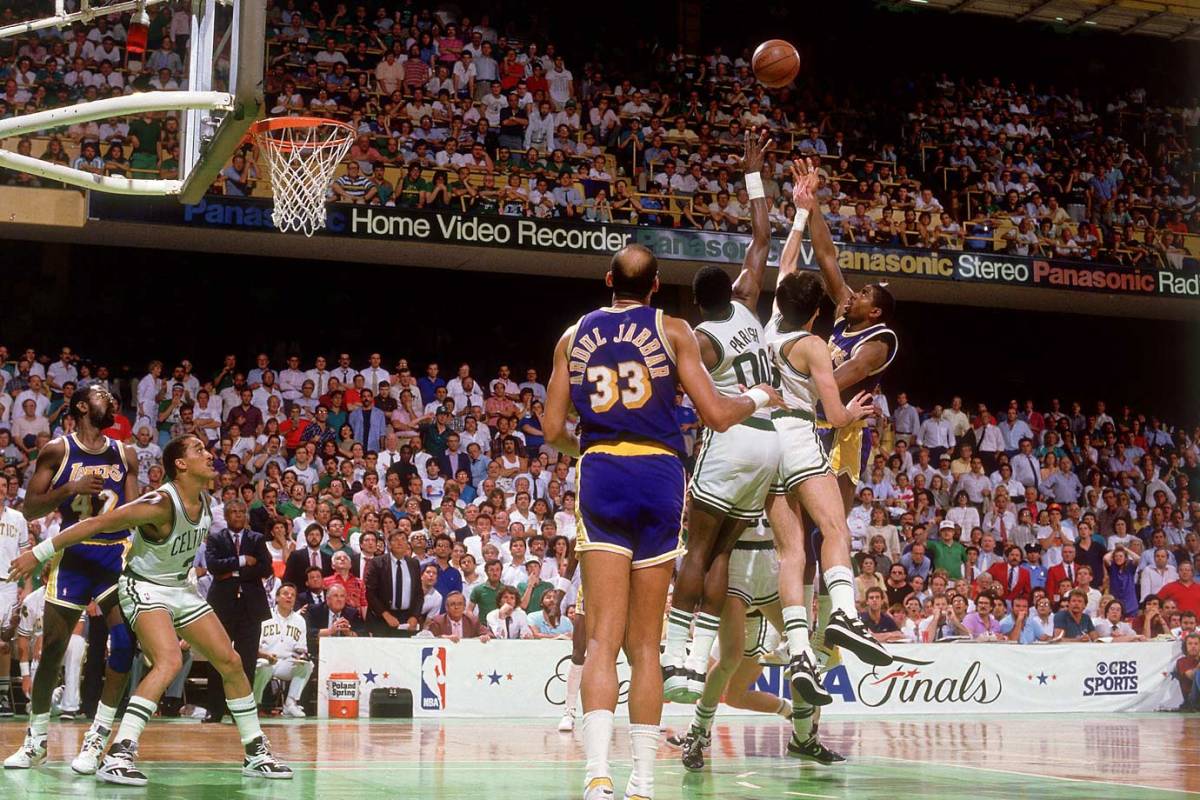
In one of the most memorable moments in Finals history, Magic Johnson won Game 4 with what he called his "junior, junior, junior sky hook." That victory in Boston gave the Lakers a 3-1 lead; they wrapped it up two games later in Los Angeles, where 39-year-old Kareem Abdul-Jabbar scored 32 points and Magic closed with 16 points, 19 assists and eight rebounds. Johnson became the fourth player to win the regular-season and Finals MVP awards.
Ralph Sampson | Game 5, 1986
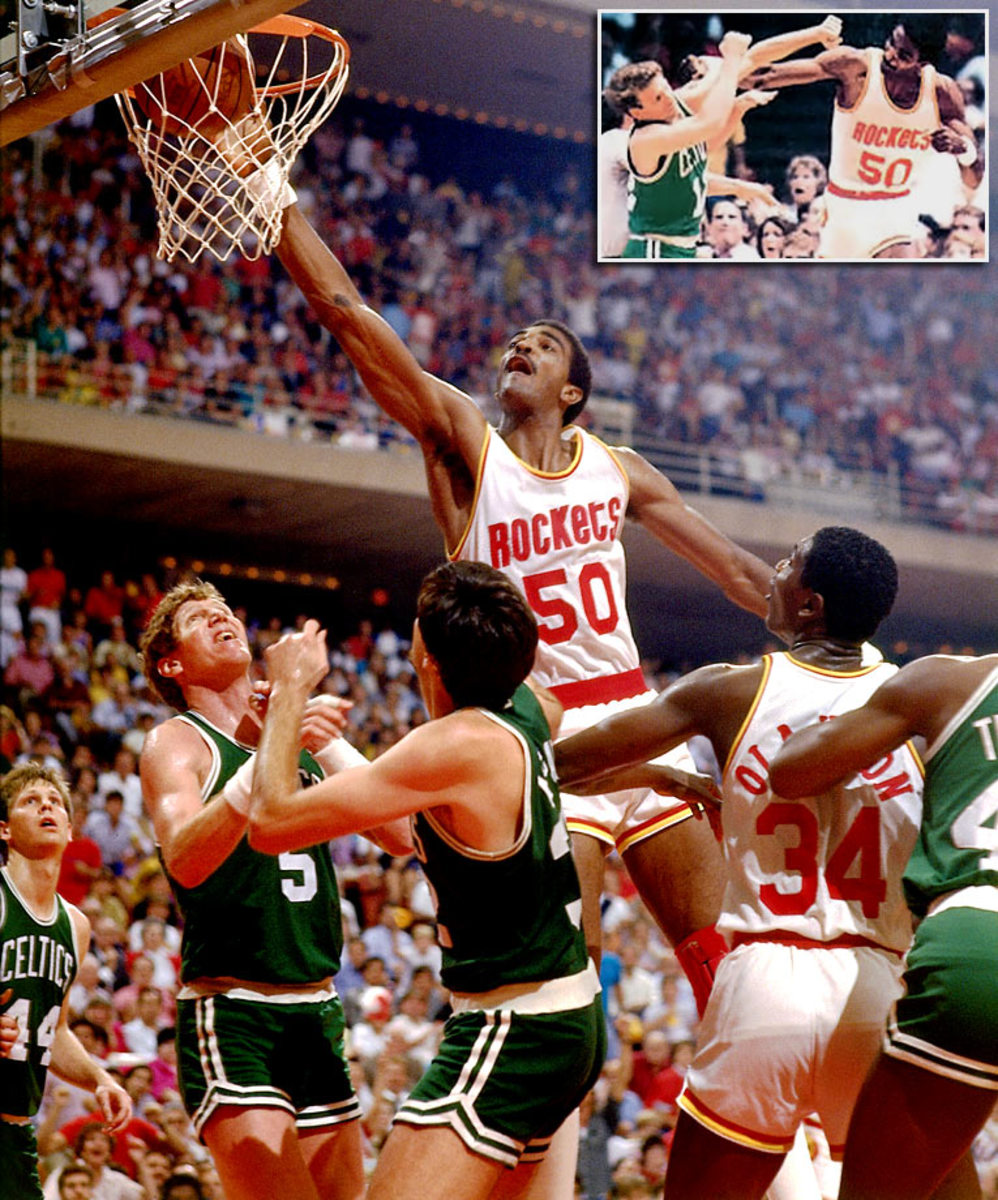
Ralph Sampson brawled with Boston guard Jerry Sichting (inset) early in the game and subsequently cursed in a live interview with CBS just moments after both players were ejected. The Rockets then routed the Celtics to extend the series to a sixth game. The Celtics won Game 6 at Boston Garden to claim their 16th championship.
Gerald Henderson | Game 2, 1984
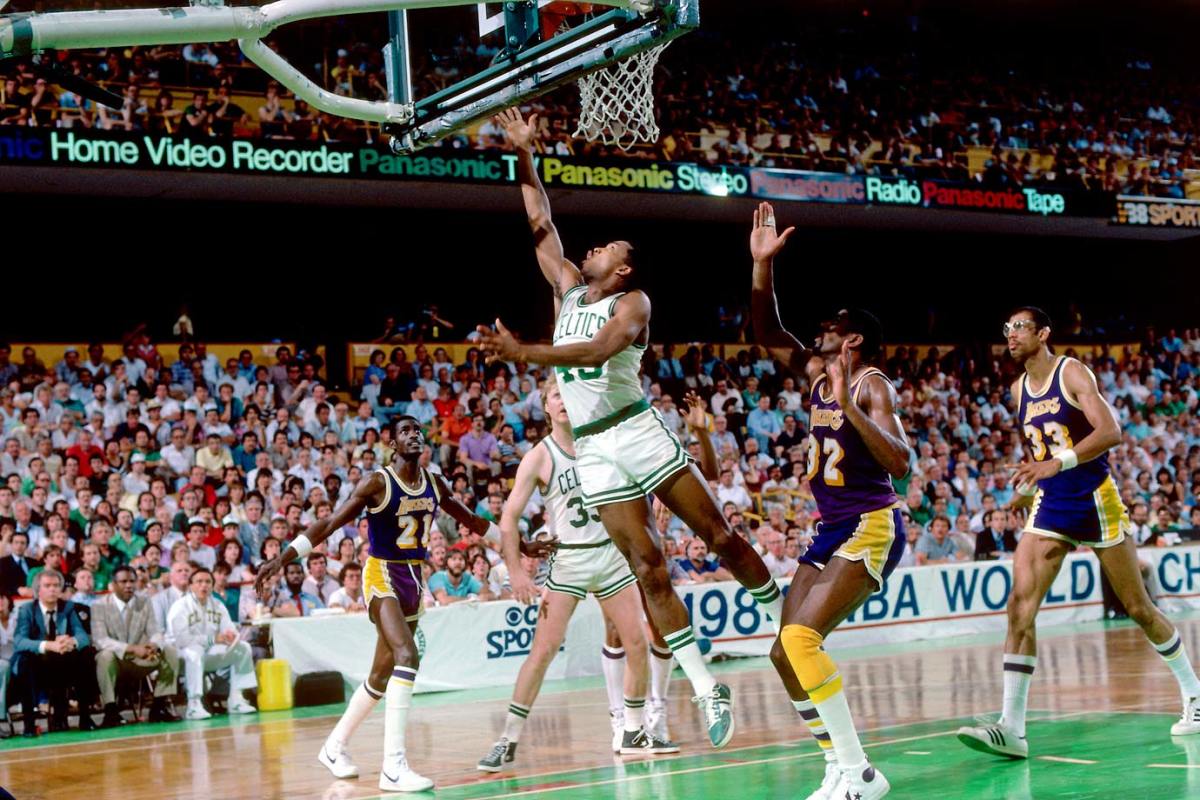
The Lakers had the Celtics on the ropes, leading the series 1-0 and nursing a 115-113 advantage with 15 seconds left in Game 2. But Gerald Henderson picked off James Worthy's lazy backcourt pass and turned it into a game-tying layup. Boston prevailed in overtime to climb back into the series.
Julius Erving | Game 4, 1980
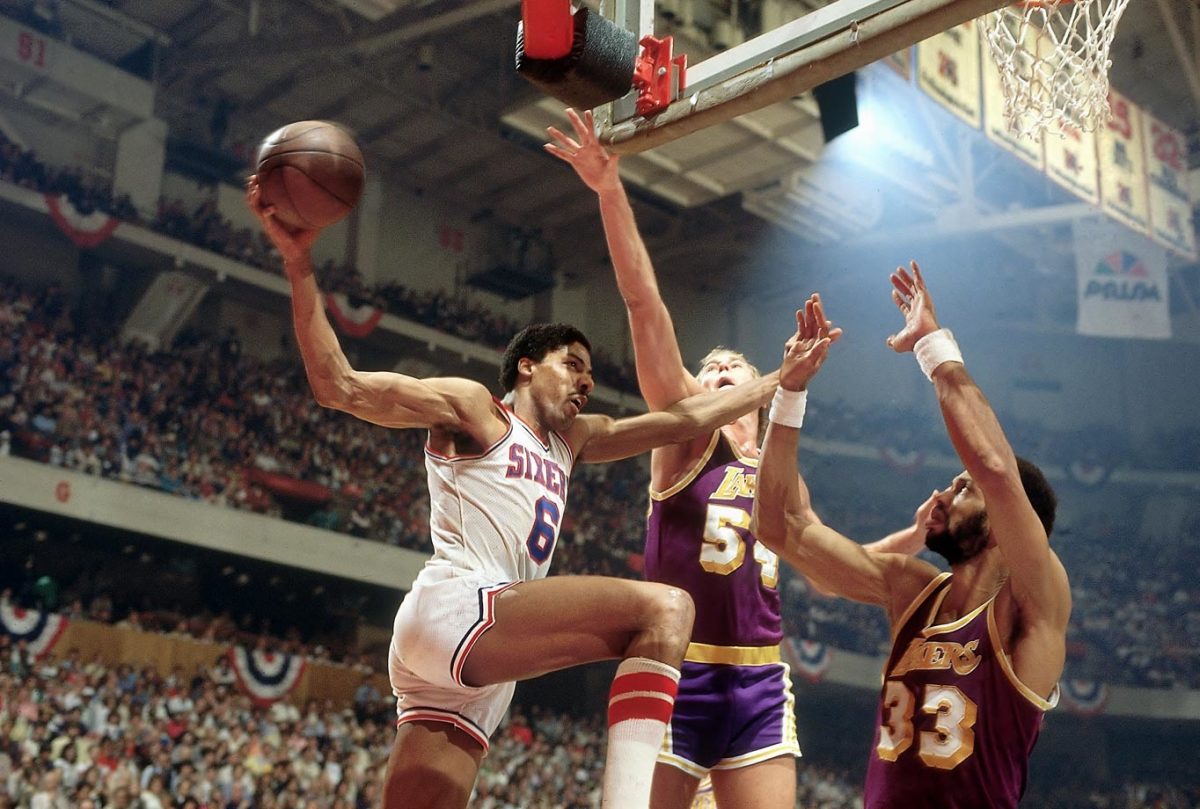
Dr. J's out-of-this-world reverse layup against the Lakers is still hailed by Magic Johnson as the greatest play he's ever seen.
Magic Johnson | Game 6, 1980
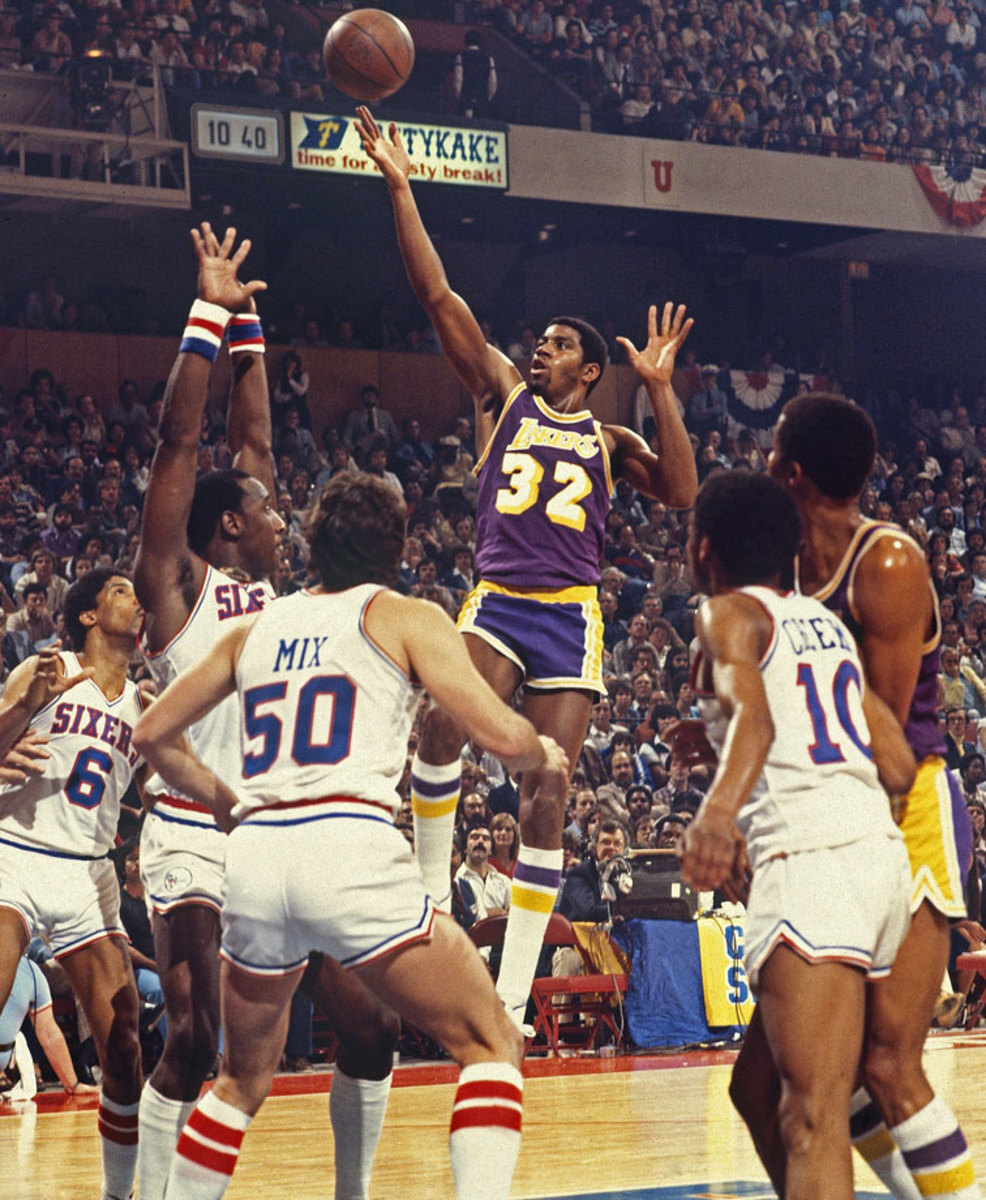
To offset Kareem Abdul-Jabbar's ankle injury, Magic Johnson moved to center and guided the undersized Lakers to a championship-clinching road win over the 76ers. The rookie Johnson scored 42 points and grabbed 15 boards.
Gar Heard | Game 5, 1976
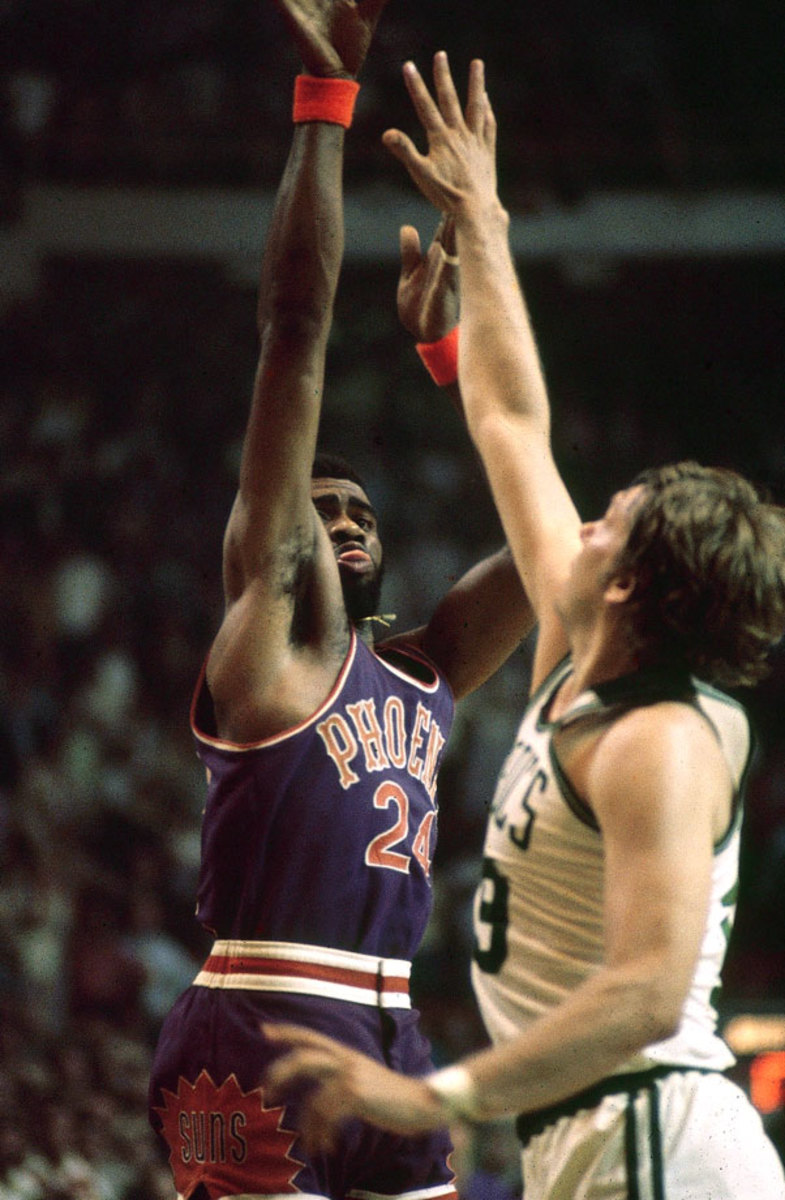
Suns forward Gar Heard nailed a turnaround 22-footer at the buzzer to force a third overtime. Heard's improbable shot helped put the Celtics' 128-126 victory in the conversation of the greatest games in NBA history.
Walt Frazier | Game 7, 1970
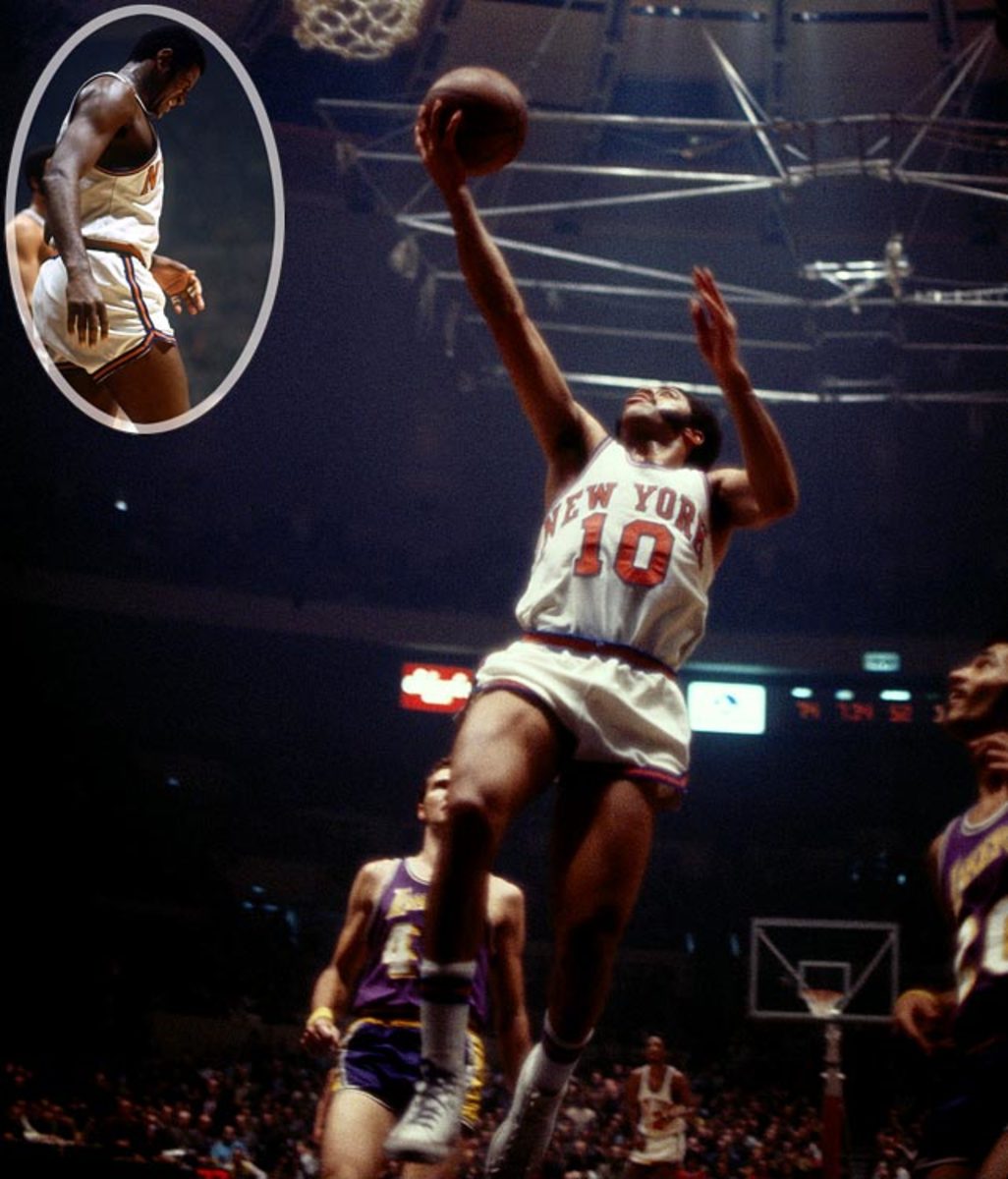
An injured Willis Reed (inset) made a dramatic entrance and scored two immediate baskets, further energizing the crowd at Madison Square Garden. He then watched Frazier (pictured, 36 points, 19 assists) and the Knicks throttle the Lakers to win the championship.
Jerry West | Game 3, 1962; Game 3, 1970
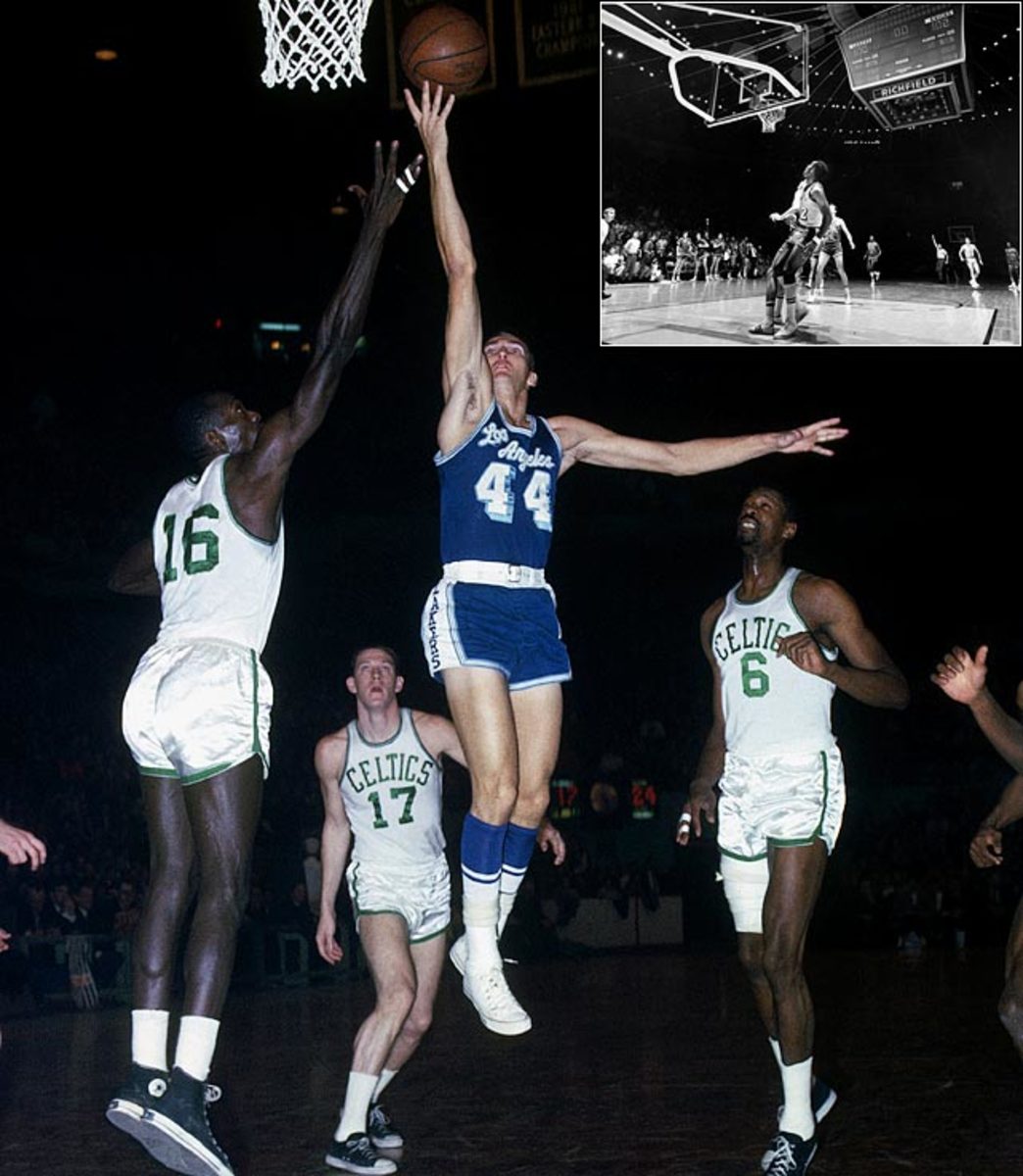
The Logo was a postseason force, including being named the 1969 Finals MVP even though the Lakers lost the series to Boston. Two more signature moments: his steal and game-winning layup to give the Lakers a 2-1 series lead in 1962 (Boston won it in seven); and his buzzer-beating 60-footer (inset) to force overtime against the Knicks in '70 (New York won the game and the series, forcing West to wait two more years for his first and only title).
Elgin Baylor | Game 5, 1962
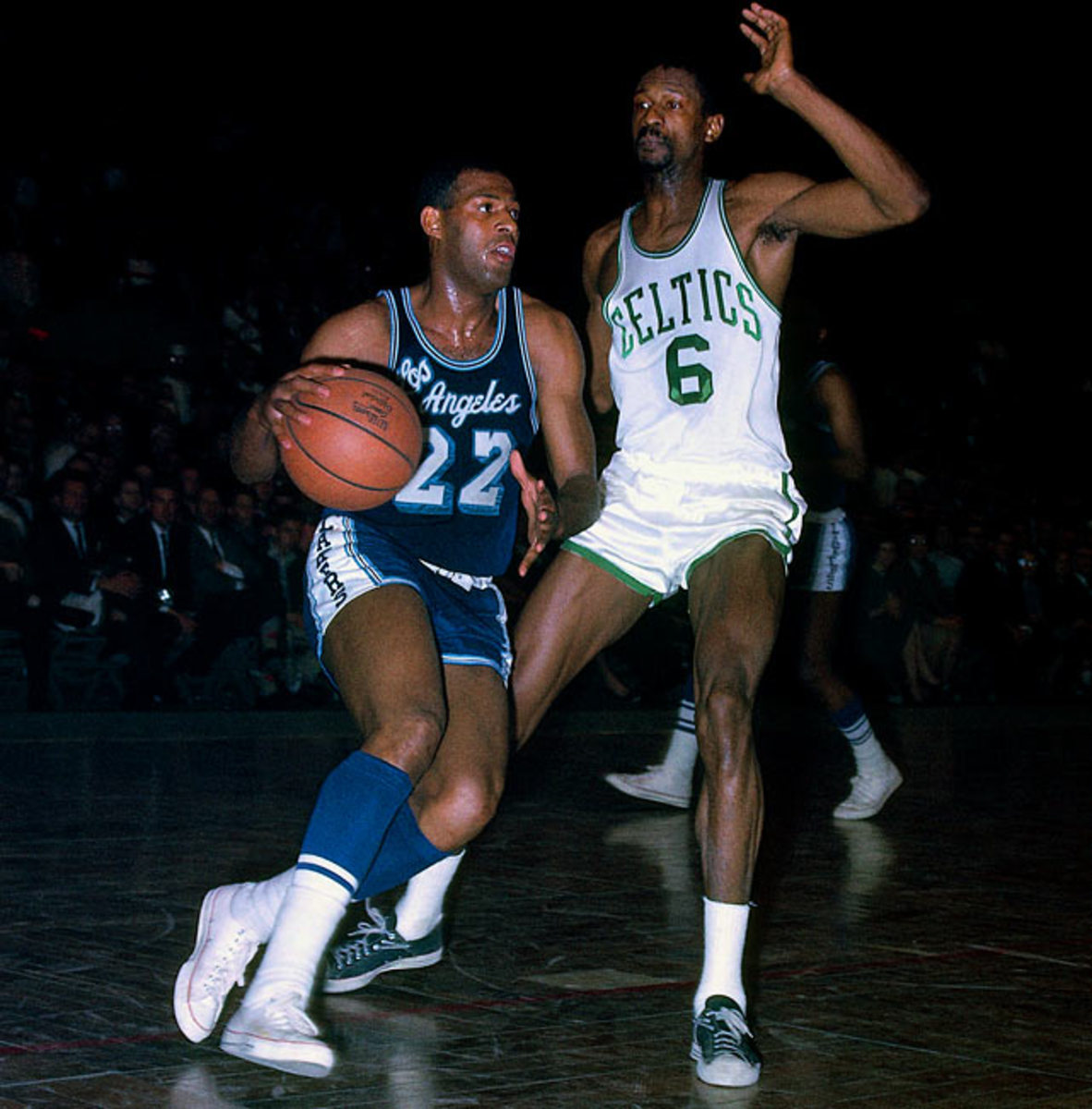
Baylor erupted for a Finals-record 61 points and grabbed 22 boards as the Lakers won 126-121 at Boston Garden to take a 3-2 series lead. But the Celtics rallied to win Games 6 and 7 (including a 110-107 OT victory in the clincher) in a classic first Finals meeting between L.A. and Boston.
Bill Russell | Game 7, 1962
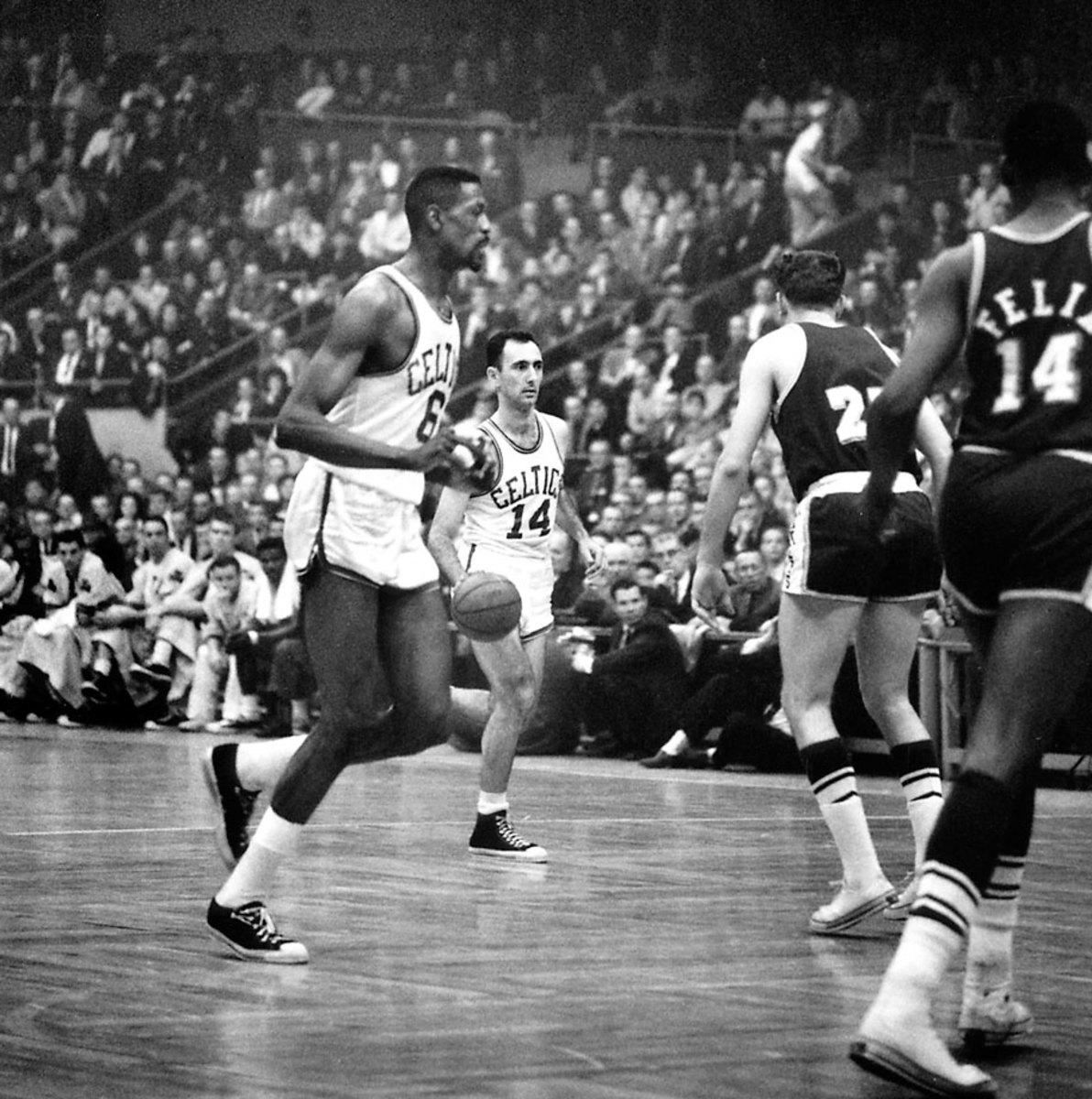
In one of the greatest winning-take-all games in NBA history, the Celtics beat the Lakers 110-107 in overtime behind Bill Russell's 30 points and 40 rebounds. Bob Cousy memorably dribbled out the clock.
Bob Pettit | Game 6, 1958
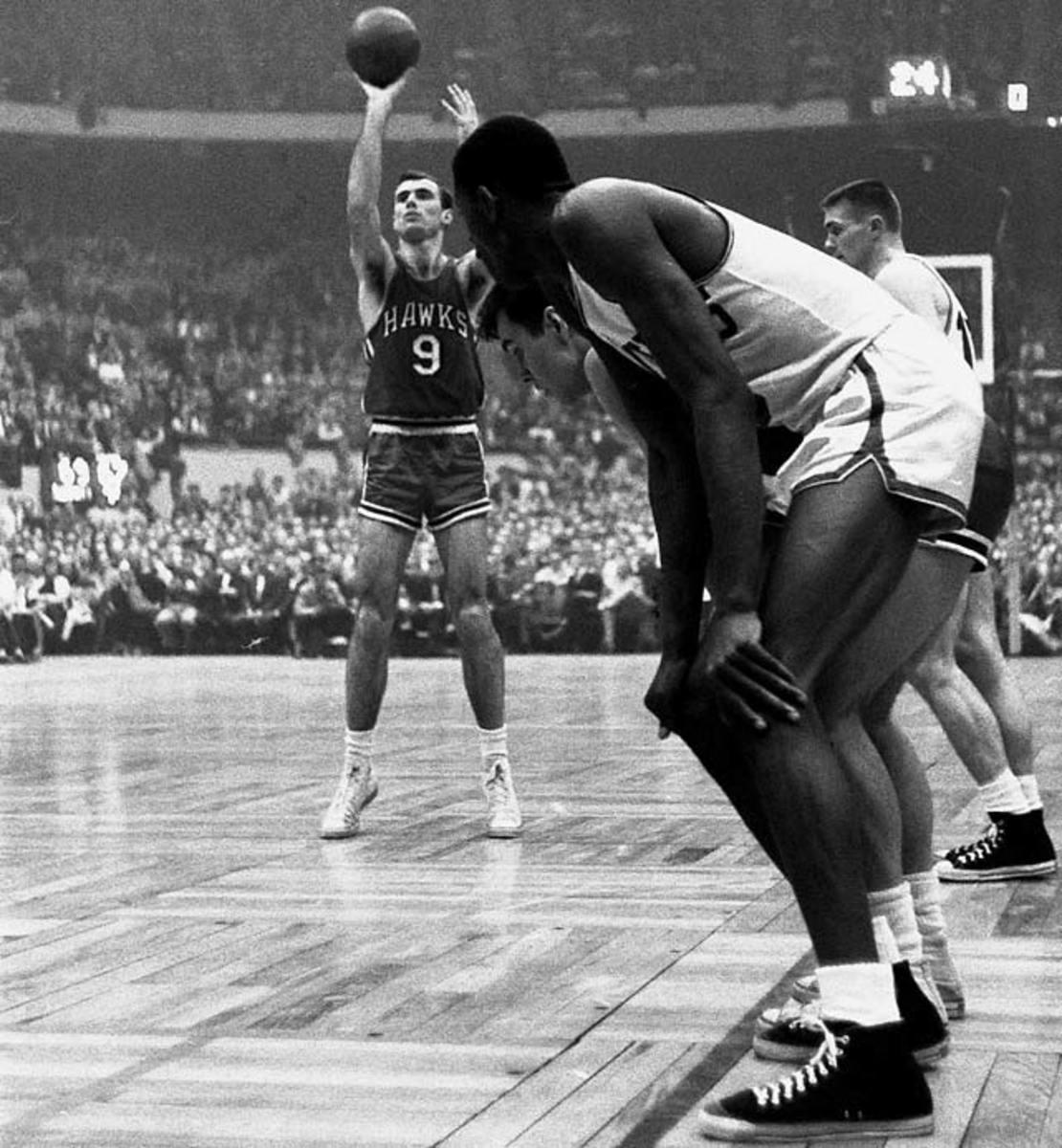
The St. Louis forward scored 50 points (including 19 in the fourth quarter) in his team's title-clinching win against the Celtics.
